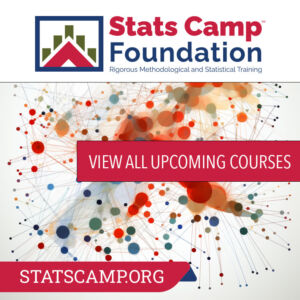Are you ready to embark on a journey into the world of quantitative research? Whether you’re a seasoned researcher or just beginning your academic journey, understanding how to formulate effective research questions is essential for conducting meaningful studies. In this blog post, we’ll explore examples of quantitative research questions across various disciplines and discuss how StatsCamp.org courses can provide the tools and support you need to overcome any challenges you may encounter along the way.
Understanding Quantitative Research Questions
Quantitative research involves collecting and analyzing numerical data to answer research questions and test hypotheses. These questions typically seek to understand the relationships between variables, predict outcomes, or compare groups. Let’s explore some examples of quantitative research questions across different fields:
 Education:
Education:
- What is the relationship between class size and student academic performance?
- Does the use of technology in the classroom improve learning outcomes?
- How does parental involvement affect student achievement?
- Health Sciences:
- What is the effect of a new drug treatment on reducing blood pressure?
- Is there a correlation between physical activity levels and the risk of cardiovascular disease?
- How does socioeconomic status influence access to healthcare services?
- Business and Marketing:
- What factors influence consumer purchasing behavior?
- Is there a relationship between advertising expenditure and sales revenue?
- How do demographic variables affect brand loyalty?
Stats Camp: Your Solution to Mastering Quantitative Research Methodologies
At StatsCamp.org, we understand that navigating the complexities of quantitative research can be daunting. That’s why we offer a range of courses designed to equip you with the knowledge and skills you need to excel in your research endeavors. Whether you’re interested in learning about regression analysis, experimental design, or structural equation modeling, our experienced instructors are here to guide you every step of the way.
Bringing Your Own Data
One of the unique features of StatsCamp.org is the opportunity to bring your own data to the learning process. Our instructors provide personalized guidance and support to help you analyze your data effectively and overcome any roadblocks you may encounter. Whether you’re struggling with data cleaning, model specification, or interpretation of results, our team is here to help you succeed.
Courses Offered at StatsCamp.org
- Latent Profile Analysis Course: Learn how to identify subgroups, or profiles, within a heterogeneous population based on patterns of responses to multiple observed variables.
- Bayesian Statistics Course: A comprehensive introduction to Bayesian data analysis, a powerful statistical approach for inference and decision-making. Through a series of engaging lectures and hands-on exercises, participants will learn how to apply Bayesian methods to a wide range of research questions and data types.
- Structural Equation Modeling (SEM) Course: Dive into advanced statistical techniques for modeling complex relationships among variables.
- Multilevel Modeling Course: A in-depth exploration of this advanced statistical technique, designed to analyze data with nested structures or hierarchies. Whether you’re studying individuals within groups, schools within districts, or any other nested data structure, multilevel modeling provides the tools to account for the dependencies inherent in such data.
Conclusion
As you embark on your journey into quantitative research, remember that StatsCamp.org is here to support you every step of the way. Whether you’re formulating research questions, analyzing data, or interpreting results, our courses provide the knowledge and expertise you need to succeed. Join us today and unlock the power of quantitative research!
